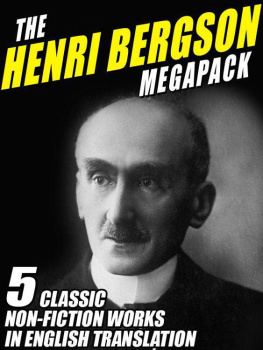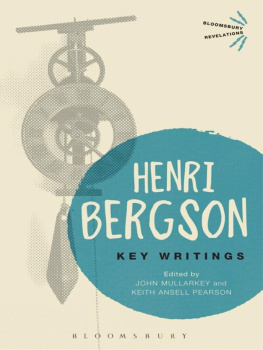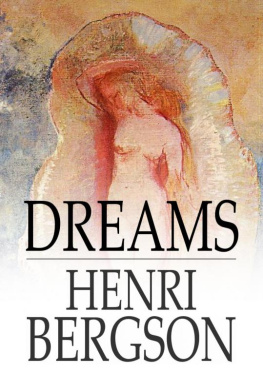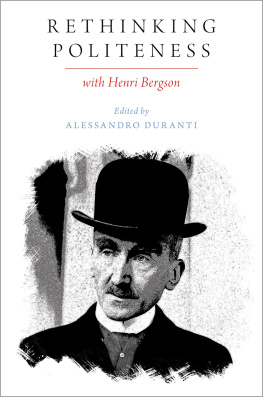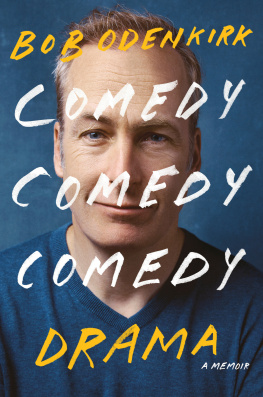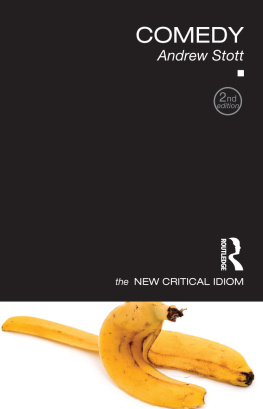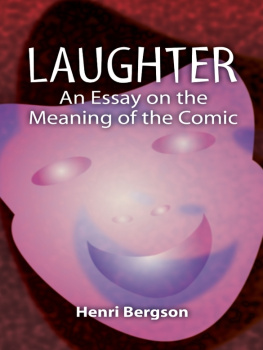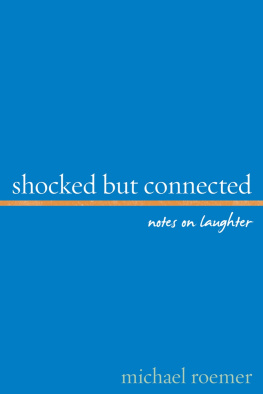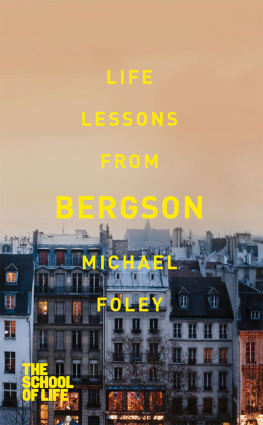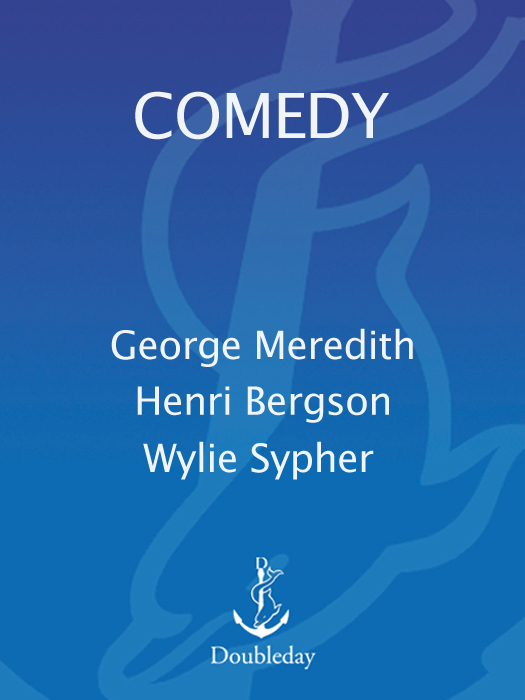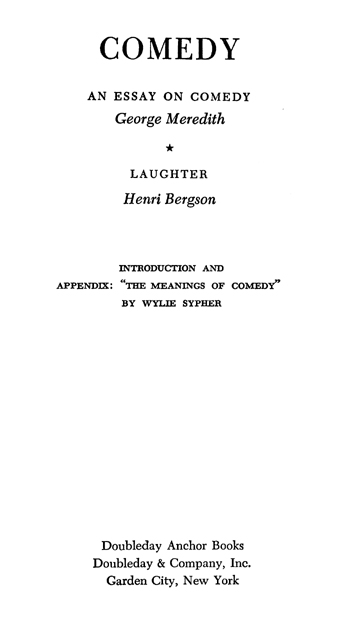Library of Congress Catalog Card Number 56-9387
Copyright , 1956, by Wylie Sypher
All Rights Reserved
The translation of Bergsons Laughter in this Anchor edition is used by arrangement with the Presses Universitaires de France.
Typography by Joseph P. Ascherl
eISBN: 978-0-307-83077-7
v3.1
Contents
INTRODUCTION
Everyone who has read Marcel Prousts novels, especially The Past Recaptured, knows something of the philosophy of Henri Bergson, for Proust fulfilled in art several of the notions of time and intuition and memory Bergson developed in his influential books like Time and Free Will, Creative Evolution, and The Two Sources of Morality and Religion, all of them accepting vitalism instead of mechanism as the explanation of human experience. Bergson had begun as a mathematician before he read deeply in Herbert Spencer, then finally emerged as the most celebrated modern philosopher of intuition. At Bergsons death in 1941 Paul Valry paid national tribute to the Frenchman who, like Pascal, made reason poetic and believed that intuition, not logic, attains the absolute. Bergsons volatile and difficult ideas are more accessible in his essay on Laughter (1900) than in his philosophic works, famous as they are. This essay began to take form as early as 1884 in his academic lecture on Le Rire: de quoi rit-on? pourquoi rit-on?
Just seven years previously, in February, 1877, the English novelist George Meredith had, somewhat nervously, read to the London Institution a paper on The Idea of Comedy and the Uses of the Comic Spirit [An Essay on Comedy]. As lecturer, of course, Meredith could hardly compete with Bergson, who as appointee at the cole Normale Suprieure and at the Collge de France drew overflowing, indeed reverential, crowds to hear his quietly spoken attacks on materialism and mechanism in modern thought. Yet Merediths essay has become one of the classic documents on comedy. As novelist, Meredith has never enjoyed great popularity, perhaps because of his mannered prose. Admittedly, however, his glittering Ordeal of Richard Feverel and The Egoist are among the most spirited, artfully paced social satires in British fiction, and something of the rarity of style and substance in these novels reappears in The Idea of Comedy. Thus, as is the case with Bergson, we can more easily approach Meredith through this little essay than through most of his major works.
The relation between Bergsons essay on comedy and Merediths is not simply chronological: essentially both were reacting against the coarse logic, the machinery, of the nineteenth century, against everything cut-and-dried. Bergson believed that life is a vital impulse, an lan vital, not to be understood by the reason alone. For him, life is instinct, and the real meanings of experience must be sought along the fringe of intuitions surrounding every clear idea. In The Two Sources of Morality and Religion he claims that morality itself springs from intuition, not reason, and that the letter kills the spirit. This theme is carried over into the essay on Laughter, for he sees the comical as something mechanical encrusted on the livingmovement without life. The absurdity of logical systems was already proved in Merediths Richard Feverel (1859), in which Sir Austin tries to rear his son on the high scientific principle that Sin is an alien element in our blood. The inevitable and human outcome is that the System seems to triumphjust when it is about to fall. Sir Austin sees Richard destroy himself and his wife, along with the logical System: Richard was no longer the Richard of his creation: his pride and his joy: but simply a human being with the rest. So Sir Austin concludes: It is useless to base any System on a human being.
Merediths essay needs to be supplemented by the Prelude he wrote to The Egoist (1879), which rephrases his theory of comedy and serves as a half-poetic comment on Bergsons views also. Here, like Bergson, he finds comedy a cure for the malady of sameness, our modern malady, especially the sameness that drove us in a body to Science the other day for an antidote. But science can tell us little of human life, simply because we have little to learn of apes; like Bergson, Meredith rejects the nave nineteenth-century faith in laws of evolution. To cure our sameness, we must learn to be alive, to be quick in the soul, and there should be diversity in the companion-throbs of your pulses. Comedy teaches us to look at life exactly as it is, undulled by scientific theories. Comedy banishes monstrous monotonousness. It teaches us to be responsive, to be honest, to interrogate ourselves and correct our pretentiousness. So the comic spirit is born of our united social intelligence, which shows us our individual countenances, and thus keeps us alive. The comic spirit is the ultimate civilizer in a dull, insensitive world. She watches our vanity, our sentimentalism, with a birch rod; she strips us of our affectations. In Comedy is the singular scene of charity issuing of disdain under the stroke of honorable laughter.
Bergson would heartily agree, however his views may differ in detail. For both writers are really concerned with one kind of comedya kind that above all others was needed in the nineteenth centurycomedy of manners. And they both read into comedy of manners new social meanings.
This should not surprise us, since all the great writers of the nineteenth centuryStendhal and Thoreau, Mill and Dostoevsky, Arnold and Flaubertsooner or later found themselves facing a cultural crisis in the middle-class: how to guard the person himself from his society. One cannot read Bergsons essay without remembering what Marx said in 1848: that the middle class has deprived man of his individuality and made him an appendage to the machine. Bergson, like Meredith, saw this very danger and remarked that regulating life as a matter of business routine is more widespread than might be imagined. This mechanization (the word is Bergsons) is the quintessence of pedantry, which is nothing else than art pretending to outdo nature. Bergson spent all his philosophy protesting against the mechanical, seeking to discern in us the individuality that escapes our ken, attempting to protect what is inward and spontaneous from what is automatic. To Bergson laughter is an exposure of our ready-made gestures and values, and the comic figure is one who is not a man but, instead, a clockwork apparatus leading the special kind of life a puppet seems to havethe malady of sameness, Meredith called it.
Bergson finds, also, that our mechanical behavior is one result of the division of labor (here let us invoke Adam Smith, not Marx). In his closing pages Bergson presents us with the modern comic typethe professional man who acts with rigidity. He thinks with the automatism of his business code; he has the egoism of the expert, the inhumanity of those who dwell inside the small societies formed on the surface of Society at large. This comic figure is identified by his professional callousness, his inelasticitywhich is a mode of pride. The automatic responses of this egoist make him appear, when we look at him attentively, like a ready-made product standardized for the market. The motor-efficiencies of the specialist (and we are now all specialists) give him the aspect of one who is absent-minded, or who is insensitive, incapable of authentic personality. He lives by formulas, not by animation, and his behavior is a series of repetitions. But life should be a negation of repetition. So we laugh at him. Society holds over him the threat of correction whenever he proves himself unadaptable. Here Bergson could have relied upon Darwins theory that in the course of biological evolution the unadaptable perish. However, Bergson would be less sympathetic to Darwin than to someone like John Ruskin, who said the same thing about the ready-made personalities of the nineteenth-century: No such thing as a Man, exclaimed Ruskin in


